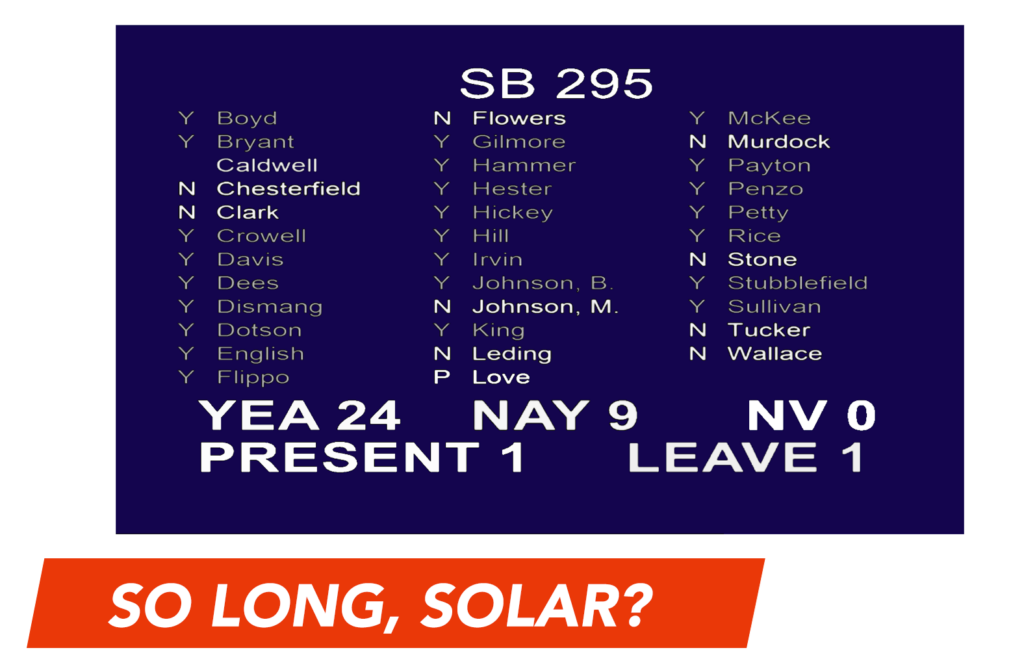Motivated by supremacy, not service, the Senate tries to undercut solar in favor of big utility. It’s a pattern.
Solar policy is pretty technical stuff, which is why the legislature should stop crafting the industry’s regulatory mandates and leave it to experts over at the Public Service Commission (PSC), according to Sen. Stephanie Flowers.
We could get into the policy details that SB295 proposes, but the Arkansas Times has done the heavy lifting in explaining the nuts and bolts of the bill. Currently in Arkansas, utility companies give solar users a full retail credit for home-generated energy. SB295 would reduce the credit from retail price to a wholesale one. The bill does a few more things, which the Times also outlined.
Let’s zoom out from the proposal’s details, though: the Senate’s attempt to undercut the solar industry is neither new nor surprising. Members have already tried to bypass the PSC’s role in regulating utilities, and this time, the legislature is using consumer protection language to cover their motive. Not only does the legislature want to keep our energy monopolies happy, Arleg also wants to be the only state body doing it.
Some Solar History
Arleg tried to rollback solar gains at the behest of big utility, namely Entergy, back in 2021; that legislation would have undercut the PSC’s mandated regulatory power and decimated net-metering. During that session Entergy, which is the state’s largest energy provider, had a firm grip on elected leaders including then-Governor Asa Hutchison. When the 2021 pro-utility legislation stalled, Hutchinson lobbied Arleg members to get on board with the bill that favored Entergy. But it was a bad look for lawmakers and the governor to blatantly side with an electric conglomerate over Arkansas consumers.

Similarly, the 2023 effort is clearly pro-utility, but this time lawmakers have a messaging strategy. Members brushed up their talking points on the bill in attempts to sound in favor of consumers, not utility monopolies. Some examples made on the Senate floor in favor of the bill:
- Competition from the booming solar industry threatens utility companies
- It’s important to help utilities so they don’t pass on expenses to non-solar consumers
- Rural consumers should not foot the bill for wealthy solar-purchasers
- We cannot let the system of utilities fail
- We trusted the PSC but they disappointed us, so we’re taking charge
Apparently the pro-consumer messaging strategy worked; the bill passed the Senate on a vote of 24-9.
Some Hypocrisy
We’d be remiss, however, not to mention the messaging strategy’s undeniable hypocrisy. For the past 8 weeks, proponents of school choice have used arguments in favor of the LEARNS Act that are antithetical to the ones above. The same legislators who made the aforementioned statements on upholding the status quo were the same ones against maintaining the status quo in public schools. Those who said rural Arkansans shouldn’t pay the price for wealthy solar users are the same lawmakers who endorsed taxpayer-funded vouchers for private school tuition. In under one week, the “fund students, not systems” motto has been replaced with a fund systems, not solar sentiment. “Fight the status quo” rhetoric has been usurped by maintain the status quo messaging.
The messaging contradiction demonstrates our legislature’s insatiable quest to win more power instead of serving the people. Power — not problem solving— dictates the political priorities and behavior of the 94th General Assembly. Supremacy — not separation of powers — allows the Senate to overstep, ignoring the role of the PSC and forging solar policy that undermines a thriving, competitive market. Arkansas’s solar industry is the latest casualty of Arleg’s obsession with total rule. Which industry, group, or guaranteed right will be next?





